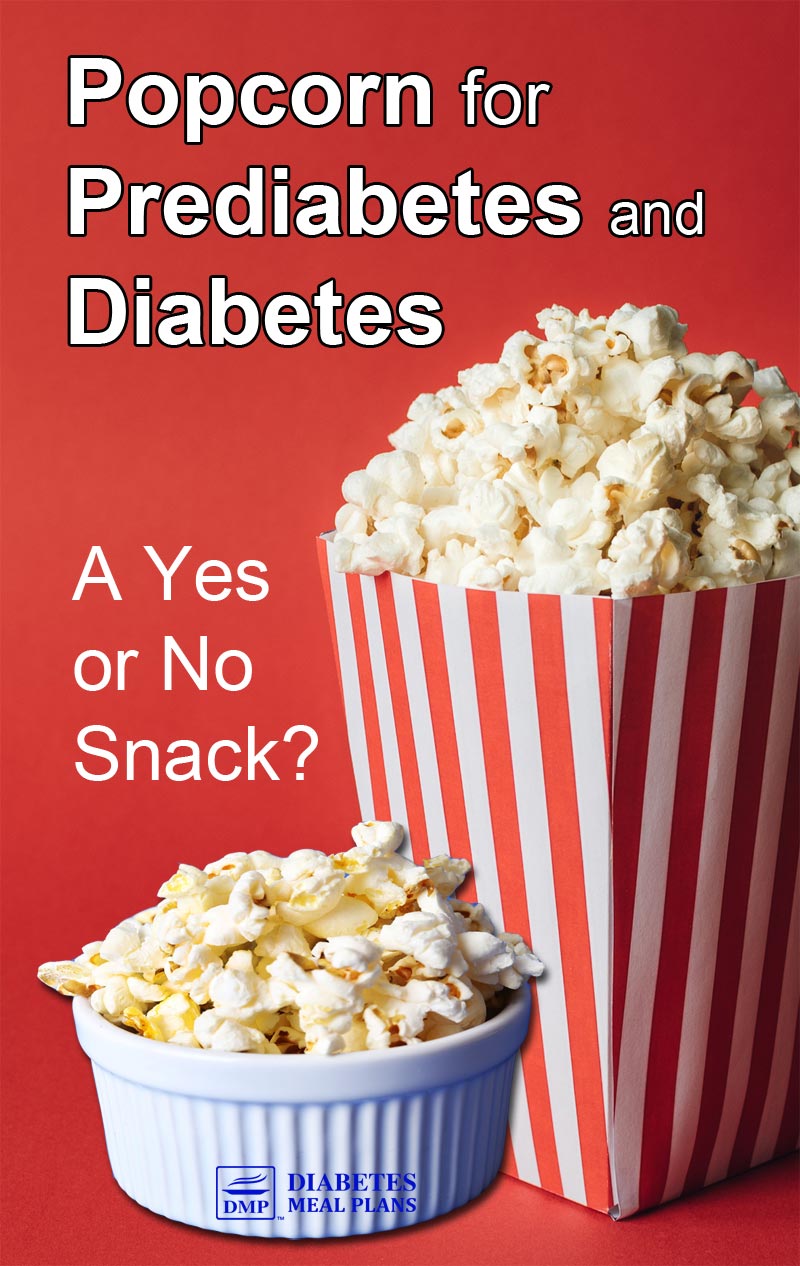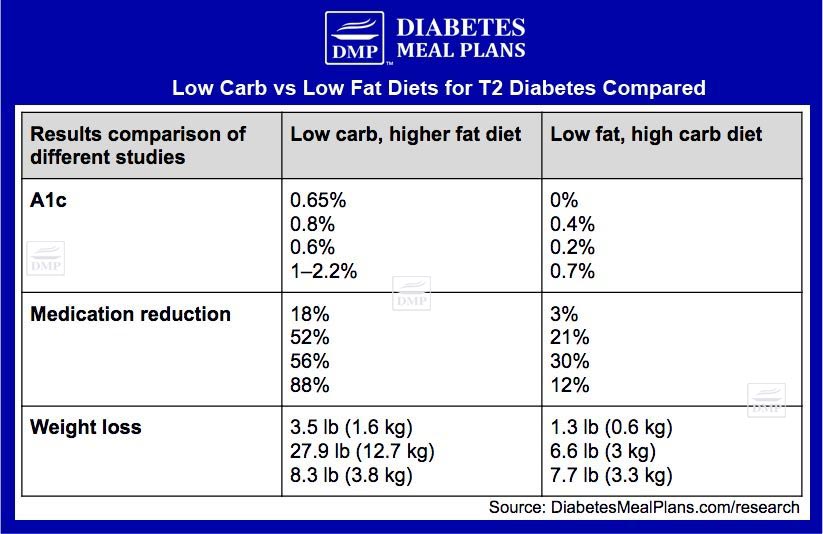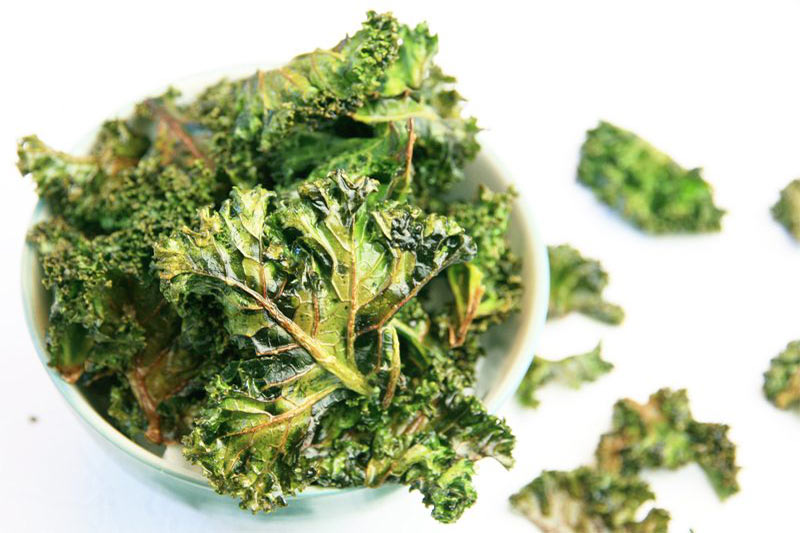Table of Contents[Hide][Show]
If you love your crunchy snacks, you may be wondering whether replacing crisps for popcorn is better for diabetes and prediabetes.
That’s a great question. Unfortunately, the answer is probably not.
If you’d like to understand why, continue reading the information below…

Popcorn Nutrition Facts
Here are some basic nutrition facts for one cup (7.9 g) of regular, butter-flavored microwave popcorn:
- Calories: 44
- Total carbohydrates: 4.3g
- Dietary fiber: 0.8g
- Protein: 0.5g
- Fat: 2.6g
Most people would agree that your average bag of buttery popcorn isn’t very healthy – all that salt and butter surely can’t be a great combination for heart health.
But despite these factors, for a person with type 2 diabetes and prediabetes, the worst offender is not fat or sodium, it’s carbs.
Okay, 4.3 grams of carbs isn’t all that bad overall, that’s true – if you can stick to just one cup.
But even then, the thing is, popcorn is essentially all carbs.
Carbohydrates are the nutrient that has the greatest, direct impact on blood sugar and A1c levels.
The glycemic index of microwave popcorn ranges from 62 to 89, making it high glycemic index. That’s because it is all carbs and there is very little fiber to slow down the carb load.
Factoring in the fiber content, you’re still going to be consuming 3.5 grams of net carbs (total carbs minus fiber = net carbs) per one cup serve.
Again, in and of itself, 3.5 grams is not all that much, so for the odd portion controlled snack popcorn is certainly one of the best options, compared to things like chips.
However, it’s very important to emphasize that the serving size is just one cup of popcorn, which we can all agree is a very small serving!
When was the last time you sat down to a snack of popcorn or went to the theater and ate a dainty half cup of popcorn?
Typically, popcorn is eaten in great ‘bucket’ quantities, and often while you’re distracted by a TV show or movie. And this kind of mindless snacking can get you in big blood sugar trouble!
Please pin, tweet or share; then keep on reading.

Research on Popcorn and Diabetes
Quite frankly, there is no specific research on popcorn for diabetes. That’s not surprising since it’s not a food that’s really going to help with blood sugar and A1c control.
There was one mention of microwave popcorn and it’s contribution of trans fats, which we know are very unhealthy. In fact, consuming trans fats increases the likelihood of heart disease 2.5- to >10-fold compared to saturated fats.
And in one study, researchers evaluated whether eating popcorn produced a greater feeling of fullness (satiety) than eating potato chips. Yes, they did find this was true, but only after eating 6 cups of popcorn – you certainly do not want to do that!
We also know that diets higher in carbohydrates can lead to metabolic syndrome – high blood sugar, weight gain, high blood pressure, and high cholesterol.
A study of over 8,000 people found that both males and females who ate a diet higher in carbohydrates had a higher prevalence of metabolic syndrome. This was especially true for those who ate a high carbohydrate diet that was also low in fats.
When you have type 2 diabetes and prediabetes you basically have metabolic syndrome, which involves a disruption in energy metabolism, insulin resistance, and increased risk for cardiovascular disease.
If we look on the opposite spectrum, of what can help type 2 diabetes, prediabetes and metabolic syndrome, we discover research that shows a low carbohydrate diet is an effective way to reduce and reverse many of the symptoms.
For instance, when you experience an upswing in your blood sugar levels (called hyperglycemia), it can cause damage to your endothelium, which is the lining of your blood vessels. You want to keep your blood vessels in tip-top shape in order to maintain good circulation, healthy blood pressure and lower your risk of heart disease.
A 2017 study found that a low carb diet can reduce the number of circulating endothelial microparticles (a measurement of blood vessel damage) by an average 45% and improve post-meal high blood sugar. The researchers also suggest you can achieve greater blood vessel function by combining a low carb diet with a 15 minute walk directly after each meal.
A review of 9 studies reported that low carb diets were associated with lower A1C levels, reduced triglycerides, and increased HLD “good” cholesterol levels.
Another review found that low carb diets (under 45% of your daily calories from carbs) are associated with a greater drop in A1C levels during the first year of intervention when compared to higher carb diets.
Yet another study, showed the positive impact that a very low carbohydrate, high fat ketogenic diet can have for type 2 diabetes.
After 32 weeks, the diabetic participants on a low carb diet saw a decrease in their A1C levels of 0.8% compared to those in the control group (o.3%), and they lost a significant amount of weight (27.9 lb/ 12.7 kg) compared to those in the control group (6.6 lb/ 3 kg).
Across the board, lower carb diets are producing better outcomes that the standard low fat, high carb diet advice we’ve all been following for years.

This is no news to us here at DMP. We encourage a lower carb diet because research continues to show it’s effectiveness. And our members, who are following our guidelines and our weekly meal plans, are living proof that this way of eating works!
“I love every recipe I have tried so far. Especially appreciate the 5 ingredient ones. I have found it sooo helpful to prep all my veggies on one day and either freeze them or just refrigerate them. Makes cooking much faster! I have been eating low carb for a month and exercising every day and I do feel better and am thrilled my numbers are better, too.” ~Gini D, VIP Member.
“I just wanted to share my great results having been on this plan for only one month. 3 months ago my A1C was 8.7 and my recent blood work showed it at 7.4. My endocrinologist was very impressed and thinks I will be at the target level by my next testing in 3 months. I am excited to continue on this plan and maybe I can stop one of my injections. Thank you for your dedication to diabetes research and food plans.” ~Gloria G, VIP Member.
Conclusion: Is Popcorn OK for Diabetes?
Perhaps in small portion controlled amounts, you may get away with it. And in terms of crunchy snacks, popcorn is the better option, compared to things like chips.
But really, if you are diabetic or prediabetic, you’re best to do yourself a favor and leave that popcorn on the shelf because overall it won’t help with blood sugar regulation!
Just because popcorn is off the table, that doesn’t mean you have to go snack-less the next time you’re craving a crunchy treat!
Try these Kale Chips on for size – you’ll still get that cruncy hit without the rise in blood sugar!
Yes, green kale for chips does sound strange, but they are easy to make, very crunchy, and you’ll be surprised at how good they are – flavor them up with salt and any kind of spices you like!
Please pin, tweet or share this info to help others – thanks!


Popcorn is now off the menu. I have a Dexcom Stelo over-the-counter glucose monitor, just to keep an eye on things and see where my glucose goes after certain foods, an attempt to stay out of pre-diabetic stage. Last night I had a little over half a bag of microwave popcorn while I watched a movie, cleaned my teeth and went to bed and this morning when I checked my monitor, I then spent two full hours in an alarming glucose spike. I had eaten or drank nothing else but some water. Everyone says popcorn is a safe snack food but obviously it’s not. I’ve had full-sized candy bars that have done nothing like what that popcorn did to my glucose. Say no to popcorn 🙂↔️👉🏻🍿
Skye, good observations. Yes, we generally don’t recommend popcorn!
i thought popcorn was good. (ok) i was eating popcorn 2-3times a week 3 cups each time no wounder my ac1 was hight.
It definitely could be a contributing factor! Better snack alternatives include veggies and dip, nuts, hard boiled eggs and cheese. These are all much lower in carbs.
what about if you buy the popping corn and cook with a little oil no salt?
Hi Susan,
Popping the kernels and cooking with little oil and no salt is a good way to avoid trans fat, artificial flavorings, and other questionable ingredients but it doesn’t change the carbohydrate content. It would be best to avoid popcorn as a snack if you have diabetes or prediabetes.
I can’t thank you enough for your even handed article concerning the way popcorn affects blood sugar, etc…I take care of a widow lady who has diabetes and has recently started eating a whole bag of microwave popcorn every day! Her blood sugar is rising and she denies that it could be the popcorn! (A school nurse that it does not turn to sugar in her body!) UGH! Anyway, she has gained 7 lbs since July and I am trying hard to get her to slow down on the popcorn! Thx so much for your good information! (:
An old Italian chef introduced us to Popcorn made with Olive Oil many years ago, and that is how we’ve continued to enjoy it. Sometimes sprinkled with parmesan cheese. Delish! You are right, 1 cup is cruel!
What about airpopped popcorn?
It means it popped without oil, just air.